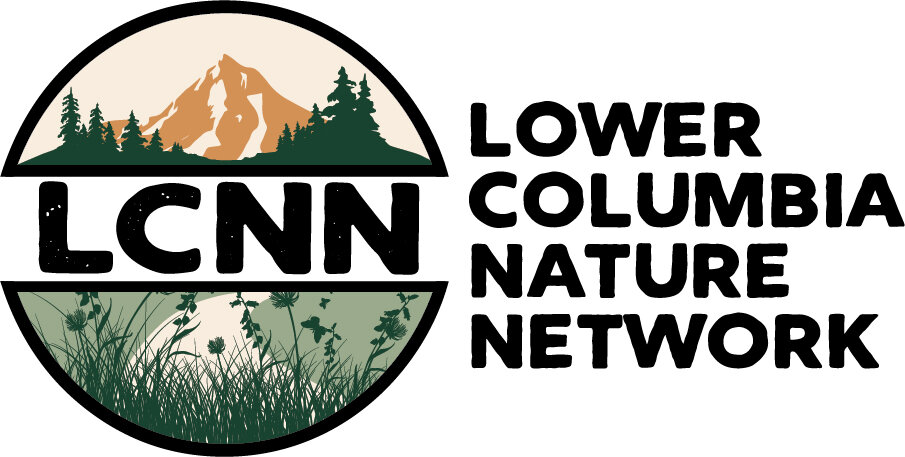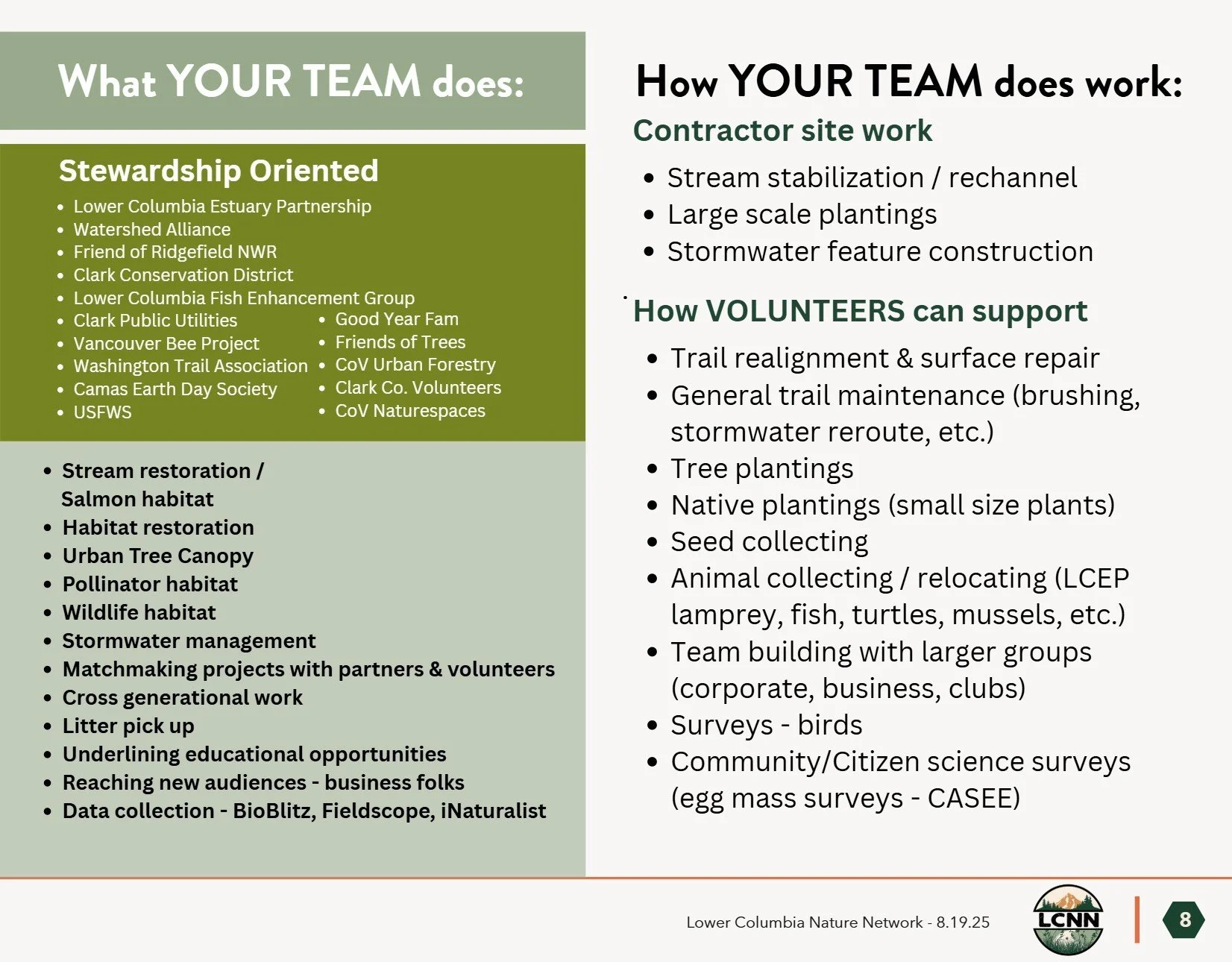Lower Columbia Nature Network - August Partners meeting wrap up
In August 2025, many of the Lower Columbia Nature Network partners came together at the Water Resources Education Center to learn about each other's work, meet new partner members and brainstorm ideas for connecting volunteers to stewardship projects.
This month's topic was the broad category of ecological restoration and the role for volunteer stewards. With a broad range of partners from Clark County, City of Vancouver's Water Resources Education Center, Vancouver's Volunteer program, Vancouver Audubon, ESD112, Clark Public Utilities, Washington Science Teacher Association, Clark Conservation District, Friends of Trees, Washington Trails Association and Lower Columbia Estuary Partnership, we had plenty to talk about!
With introductions and a brief overview of where partners work (see image 1), it was clear there are a wide range of project sizes across the southwest Washington's counties and cities. Larger projects tend to focus on the river and stream systems tied to aquatic and fish health. There are occasional unique opportunities for volunteers on project prep (such as LCEP's lamprey relocation on the Lewis River) and tree plantings after contractor grading.
Map is an overlay of WA Salmon Recovery Portal GIS map, with LCNN partner google map of project sites.
Our partners then did some brainstorming on key volunteer stewardship opportunities that are offered. Some volunteer work is on-going, while there are a few opportunities for unique engagement projects that happen on occasion, such as BioBlitz/community science input. Listed below is a summary of this work:
With changes in funding, staffing and programming, our partners are looking for ideas to address on-going, as well as new, opportunities. Across the group, we agree that it is typically easier to get funding for new capital efforts, but challenging for on-going maintenance. Also, how do we continue to reach our existing audience but also expand to other community members, especially using new technologies and platforms. Here are some of our ideas:
So what are some next opportunities? LCNN has secured funding for Oct. 1 2025 - September 2026 to keep our monthly meetings, blog and e-newsletter, as well as keep updates to our web pages. Our funders focus though is shifting to supporting our partners with community-facing events and activities (not just partner to partner work). Upcoming meeting ideas come from our partners and community, and based on our chat yesterday, our meetings can build stronger ideas and opportunities for community events. Here are some ideas. (We would love to hear from you on how we can help support your team's success):
LCNN can take the lead to organize community event opportunities - partners could then table, lead an activity, and meet community members. This could be attending existing community events that we may have not participated in before or create stand along events in collaboration with partners around a theme. For example:
Trails awareness, education and maintenance - the week before National Trails Day (usually the first Saturday in June), host a series of trail related events:
host trail guide author panel series at the Fort Vancouver Regional library
host an accessible trail hike partnered with a bird watching tour
host a trail maintenance event followed by an EE activity
host a water trail paddle and litter pick
host a trail awareness campaign event at main trail heads for dog waste pick up and education
create cities and county proclamations for National Trails Day awareness and get city / county staff involved
set up trail feedback / trip reports for our local/regional trails, ask folks to add specific information for family friendly, mobility accessibility, etc.)
support city/county web pages with more specific trail information for their web pages to make the information more user friendly
raise funds to support staff work to host more trail maintenance work parties (front country and backcountry), including student groups, business community service, etc.
pull together a common message and materials for our partners to use for the broader effort (blast the various media with events and opportunities, as well as key awareness and education)
celebrate National Trails Day!!! June 7, 2026
School Community clean up days - campus litter / dog poop clean up - Work with school grounds staff and school leadership to create a Community Clean Up day before the start of school, as well as spring clean up days. Here are some ideas:
Work with school district grounds/facilities teams to set a schedule for Community Clean Up days before school starts
Create video training for Litter Pick Kits and support schools to buy some kits (let students use at recess, clubs can use, and community gathering events). Work with partners such as Waste Connections and Clark County Green Schools?
Build the awareness message and activities for school campus clean up and waste audits. Help schools understand what to do with what they found and how to decrease litter. Use to get messaging about dog waste on school grounds.
Coordinate school grounds clean up with school garden harvest events, host regularly scheduled summer garden work parties and potluck, include litter pick ups.
Community wide outdoor events - with the lack of big community events, like Go Outdoor Days and Earth Day Festival, what are some new events and activities that might generate lots of interest. Make cross-partner events to attract a wider audience.
Coordinate school ground clean ups with other school events. Messaging about keeping school events litter free.
Look to other communities and think outside the box.....something totally new for southwest Washington and fills gaps in serving our community....adult watershed monitoring (get folks in waders and in the water looking for critters, "Hike and Hops" community gathering, attend existing community events , etc.
Thanks to all that could make it. If you weren't able to attend, please let us know your thoughts about how to connect community to stewardship and engagement events. We are here to support the amazing work that you all do.



